Introduction
In the vast world of medicinal mushrooms, Turkey Tail (Trametes versicolor) stands out as one of the most researched and revered fungi for its remarkable health benefits. With its distinctive fan-shaped appearance resembling a turkey's tail—complete with concentric rings of varying colors—this mushroom has been used in traditional medicine for centuries across various cultures. From ancient Chinese healers to indigenous North American tribes, Turkey Tail has long been recognized for its therapeutic potential.
What makes Turkey Tail particularly fascinating is how modern science has begun to validate many of its traditional uses. Research has unveiled an impressive array of bioactive compounds within this humble mushroom, offering benefits that range from immune system enhancement to gut health optimization and potential anti-cancer properties.
In this comprehensive guide, we'll explore the wide-ranging benefits of Turkey Tail mushroom, examining the scientific evidence behind its therapeutic effects, practical ways to incorporate it into your wellness routine, and important considerations for those interested in harnessing its potential. Whether you're navigating health challenges or simply looking to optimize your wellbeing through natural approaches, understanding Turkey Tail's benefits may provide valuable insights for your journey toward better health.
Understanding Turkey Tail Mushroom
What Is Turkey Tail Mushroom?
Turkey Tail mushroom (Trametes versicolor, formerly known as Coriolus versicolor) is a common polypore fungus found growing on dead logs, stumps, and fallen trees throughout forests worldwide. Its name comes from its striking resemblance to a wild turkey's tail, with fan-shaped fruiting bodies displaying concentric zones of varying colors—typically browns, tans, grays, and blues.
Unlike many medicinal mushrooms that grow primarily in specific regions, Turkey Tail is remarkably widespread, native to forests across North America, Europe, and Asia. This availability has contributed to its historical use in multiple healing traditions around the world.
In traditional Chinese medicine, where it's known as Yun Zhi, Turkey Tail has been used for thousands of years, particularly for supporting strength and longevity. Japanese traditional medicine, which calls it Kawaratake, has likewise incorporated this mushroom into healing protocols for centuries. Indigenous North American tribes used Turkey Tail in teas and poultices for various ailments.
Despite its long medicinal history, Turkey Tail is not typically considered a culinary mushroom due to its tough, leathery texture. Instead, it's usually prepared as teas, powders, or extracts to access its beneficial compounds.
Key Bioactive Compounds
Turkey Tail mushroom's health benefits derive from its impressive array of bioactive compounds. The most significant of these include:
-
Polysaccharopeptide (PSP): Discovered by Chinese researchers, this protein-bound polysaccharide has demonstrated remarkable immunomodulatory and potentially anti-tumor effects in numerous studies.
-
Polysaccharide-K (PSK): Also known as krestin, this compound has been extensively studied in Japan and is even approved as a pharmaceutical grade medicine for cancer treatment support in Japan.
-
Beta-glucans: These complex polysaccharides are known for their immune-modulating properties and ability to activate various components of the immune system.
-
Phenolic compounds: Turkey Tail contains various phenols and flavonoids with antioxidant properties that help combat oxidative stress and free radical damage.
-
Triterpenes: These compounds have demonstrated anti-inflammatory, antiviral, and hepatoprotective (liver-protecting) effects in research studies.
-
Prebiotics: Turkey Tail contains complex carbohydrates that can function as prebiotics, supporting beneficial gut bacteria.
These compounds work synergistically to produce Turkey Tail's wide-ranging health benefits, which we'll explore in detail throughout this article.

Immune System Benefits
Enhancing Immune Function
One of Turkey Tail's most well-documented benefits is its ability to enhance and modulate immune function:
Activation of Immune Cells
Research shows that Turkey Tail's polysaccharides, particularly beta-glucans, can activate several types of immune cells:
-
Natural Killer (NK) cells: These critical immune cells help identify and eliminate abnormal cells. Studies have shown that Turkey Tail extract can increase both the number and activity of NK cells.
-
Macrophages: These cells engulf pathogens and cellular debris. Turkey Tail compounds have been shown to enhance macrophage activity.
-
T cells: The polysaccharides in Turkey Tail may stimulate various T cell types, which are crucial for cell-mediated immunity.
A 2019 study published in the Journal of Immunology Research demonstrated that Turkey Tail extract significantly enhanced the activity of dendritic cells, which play a crucial role in initiating immune responses.
Balancing Immune Response
Beyond simple immune stimulation, Turkey Tail appears to help modulate the immune system, potentially helping to balance overactive or underactive immune responses:
-
Cytokine regulation: Research suggests Turkey Tail compounds can help regulate cytokine production (signaling molecules that mediate immune responses), potentially helping to control inflammation.
-
Adaptogenic properties: Like many medicinal mushrooms, Turkey Tail displays adaptogenic properties, potentially helping the body adapt to various stressors and maintain balance.
This immunomodulatory effect makes Turkey Tail particularly interesting, as it appears to help "normalize" immune function rather than simply stimulating it—potentially beneficial for both underactive and overactive immune systems.
Supporting Winter Wellness
The immune-enhancing properties of Turkey Tail make it particularly valuable during the winter months or other times of increased immune challenge:
-
Respiratory support: Several studies suggest that the immunomodulatory effects of Turkey Tail may help support healthy respiratory function and resilience during seasonal challenges.
-
Reduction in sick days: A 2014 study published in the Journal of the American College of Nutrition found that supplementation with Turkey Tail helped reduce the incidence and duration of upper respiratory symptoms compared to placebo.
-
Complement to seasonal strategies: Many integrative health practitioners recommend Turkey Tail as part of a comprehensive approach to winter wellness, alongside vitamin D, zinc, and other immune-supporting nutrients.
While more research is needed for definitive conclusions, the existing evidence suggests that Turkey Tail may be a valuable addition to seasonal wellness protocols.
Digestive and Gut Health
Prebiotic Effects
One of the most exciting areas of recent Turkey Tail research involves its effects on gut health, particularly its prebiotic properties:
Supporting Beneficial Bacteria
Turkey Tail contains complex carbohydrates that function as prebiotics—non-digestible fibers that serve as food for beneficial gut bacteria:
-
A groundbreaking 2014 study published in the British Journal of Nutrition found that Turkey Tail extract significantly increased beneficial bacteria, including Bifidobacterium and Lactobacillus species, while reducing potentially harmful bacteria.
-
Research suggests that the prebiotic fibers in Turkey Tail may selectively nourish beneficial bacteria, helping to create a healthier gut microbial balance.
This prebiotic effect is particularly valuable given our growing understanding of the gut microbiome's central role in overall health and immunity.
Improving Microbiome Diversity
Beyond simply increasing certain bacterial species, Turkey Tail appears to support overall gut microbial diversity:
-
A 2017 study in Gut Microbes found that Turkey Tail supplementation increased microbial diversity in the gut, which is generally associated with better health outcomes.
-
Greater microbial diversity has been linked to reduced inflammation, improved metabolic health, and better immune function.
Digestive Comfort and Function
Turkey Tail may also offer more direct benefits for digestive function:
-
Anti-inflammatory effects: The mushroom's compounds may help reduce inflammation in the digestive tract, potentially alleviating discomfort.
-
Digestive enzyme support: Some preliminary research suggests certain compounds in Turkey Tail may support the body's production of digestive enzymes.
-
Gut barrier function: There's emerging evidence that Turkey Tail's polysaccharides may help support the integrity of the intestinal barrier, potentially helping to prevent "leaky gut" issues.
While human studies specifically examining Turkey Tail's effects on digestive symptoms are still limited, anecdotal evidence and traditional use suggest it may be helpful for digestive comfort. More research is needed to fully elucidate these potential benefits.
Cancer Support Research
Clinical Studies
Some of the most extensive research on Turkey Tail involves its potential supportive role during cancer treatment:
Adjunctive Treatment in Japan and China
In both Japan and China, extracts of Turkey Tail have been used alongside conventional cancer treatments for decades:
-
PSK (Polysaccharide-K): This specific extract from Turkey Tail has been approved as a pharmaceutical-grade medicine in Japan since the 1980s, where it's commonly prescribed alongside conventional cancer treatments. It's covered by Japan's national health insurance for this purpose.
-
PSP (Polysaccharopeptide): This Turkey Tail extract has been extensively studied in China, with numerous clinical trials examining its effects when used alongside conventional cancer treatments.
Multiple meta-analyses have reviewed the extensive clinical research, with significant findings:
-
A 2012 systematic review in the Cochrane Database of Systematic Reviews found that Turkey Tail extracts, when used as adjuncts to conventional cancer treatments, were associated with improved survival rates in certain cancer types.
-
A 2015 meta-analysis published in the International Journal of Medicinal Mushrooms reviewed 28 clinical trials and concluded that PSK supplementation was associated with significant improvements in 5-year survival rates for several cancer types when used alongside conventional treatments.
Quality of Life Support
Beyond potential survival benefits, research suggests Turkey Tail may help improve quality of life during cancer treatment:
-
Reduced treatment side effects: Some studies indicate that Turkey Tail extracts may help reduce nausea, fatigue, and other common side effects of chemotherapy and radiation.
-
Improved immune function: Cancer treatments often suppress immune function, and Turkey Tail's immune-supporting properties may help mitigate this effect.
-
Maintained strength and vitality: Some research suggests that Turkey Tail may help patients maintain better energy levels and overall well-being during treatment.
Mechanisms of Action
Research has identified several mechanisms through which Turkey Tail mushroom may exert its effects in cancer support:
Immune System Activation
As discussed earlier, Turkey Tail stimulates various immune cells that play crucial roles in identifying and eliminating cancer cells:
-
NK cell enhancement: Natural Killer cells are particularly important for recognizing and destroying cancer cells, and Turkey Tail has been shown to increase both their number and activity.
-
T cell response: Turkey Tail compounds may enhance T cell response, which is crucial for targeting specific cancer cells.
Direct Anti-Tumor Effects
Some research suggests Turkey Tail extracts may have more direct anti-cancer effects:
-
Apoptosis induction: Laboratory studies have found that certain compounds in Turkey Tail can induce apoptosis (programmed cell death) in various cancer cell lines.
-
Anti-angiogenesis effects: Some research indicates Turkey Tail compounds may help inhibit angiogenesis—the formation of new blood vessels that tumors need to grow.
-
Cell cycle regulation: Laboratory studies suggest Turkey Tail extracts may help regulate the cell cycle, potentially reducing uncontrolled cell division.
It's important to note that most of these direct anti-cancer effects have been observed in laboratory studies rather than human clinical trials, and Turkey Tail is not considered a primary cancer treatment. Its role appears to be most valuable as a complementary approach alongside conventional oncology treatments.
Additional Health Benefits
Antioxidant Properties
Turkey Tail is rich in various antioxidant compounds that help combat oxidative stress—a key factor in aging and many chronic diseases:
-
Phenolic compounds: Turkey Tail contains numerous phenols and flavonoids with potent antioxidant properties, helping to neutralize free radicals.
-
Cellular protection: The antioxidants in Turkey Tail may help protect cellular components, including DNA, from oxidative damage.
-
Synergistic effects: Research suggests the various antioxidant compounds in Turkey Tail work synergistically, potentially offering more comprehensive protection than isolated antioxidants.
A 2017 study in the Journal of Enzyme Inhibition and Medicinal Chemistry found that Turkey Tail extract exhibited significant antioxidant activity, comparable to some standard antioxidant compounds.
Liver Support
Turkey Tail has traditionally been used to support liver health, and modern research is beginning to validate this application:
-
Hepatoprotective effects: Several studies suggest Turkey Tail extracts may help protect liver cells from various toxins and stressors.
-
Liver enzyme support: Research in animal models indicates Turkey Tail may help maintain healthy levels of liver enzymes during periods of stress.
-
Detoxification support: Preliminary research suggests Turkey Tail compounds may support the liver's natural detoxification processes.
A 2017 study published in the International Journal of Medicinal Mushrooms found that Turkey Tail extract protected liver cells from oxidative damage and helped maintain healthy liver function in an animal model of liver injury.
Respiratory Health
Beyond its immune-supporting effects, Turkey Tail may offer specific benefits for respiratory health:
-
Respiratory microbiome support: Emerging research suggests that Turkey Tail may help support a healthy respiratory microbiome, potentially contributing to better respiratory function.
-
Inflammatory modulation: The anti-inflammatory compounds in Turkey Tail may help balance inflammatory responses in the respiratory tract.
-
Antioxidant protection: The lungs are particularly vulnerable to oxidative stress due to their constant exposure to oxygen, and Turkey Tail's antioxidants may offer protection.
While research specifically examining Turkey Tail's effects on respiratory conditions is still developing, its immune-modulating and anti-inflammatory properties make it a promising area for future study.
How to Use Turkey Tail Mushroom
Forms and Preparations
Turkey Tail mushroom is available in several forms, each with its own advantages:
Powders and Capsules
These are among the most convenient forms:
- Capsules: Offer precise dosing and avoid the mushroom's naturally bitter taste
- Powders: Can be added to smoothies, coffee, tea, or other foods
- Typical dosages: 1-3 grams daily for general wellness; higher dosages may be used under healthcare provider guidance
Extracts and Tinctures
Liquid forms offer different advantages:
- Hot water extracts: Focus on water-soluble compounds like polysaccharides
- Alcohol extracts: Extract different compounds, including triterpenes
- Dual extracts: Combine both extraction methods for a more complete spectrum of compounds
- Typical dosages: Follow product-specific recommendations, usually 1-3 dropperfuls (1-3 mL) 1-3 times daily
Teas and Broths
Traditional preparation methods include:
- Simple tea: Simmering dried Turkey Tail pieces in water for 20-30 minutes
- Medicinal broth: Adding Turkey Tail to bone broth or vegetable stock for longer extraction
- Dosage: 1-2 cups daily is common for general wellness support
Recommended Dosages
Dosage recommendations vary based on the specific product, extraction method, and health goals:
For General Wellness
- Powder/capsules: 500-1000 mg, 1-3 times daily
- Extracts: 30-60 drops (1-2 mL), 1-3 times daily
- Tea: 1-2 cups daily
For Specific Health Support
Higher dosages may be appropriate in certain circumstances:
- Immune challenges: Some practitioners recommend increasing to 2-3 grams of powder or extract daily during periods of immune stress
- Therapeutic applications: In some clinical studies, dosages equivalent to 3-6 grams of dried mushroom have been used for specific health concerns
Important Considerations
- Start low and go slow: Begin with lower dosages and gradually increase
- Consistency is key: Regular, daily use typically provides better results than occasional high doses
- Professional guidance: For specific health concerns, consult with a healthcare provider knowledgeable about medicinal mushrooms
Quality Considerations
The effectiveness of Turkey Tail supplements depends greatly on product quality:
What to Look For
To ensure you're getting a high-quality product:
- Fruiting body vs. mycelium: Products made from the actual mushroom fruiting bodies generally contain higher concentrations of beneficial compounds compared to mycelium-on-grain products
- Extraction method: Look for information about the extraction process; dual extraction (both water and alcohol) provides a fuller spectrum of compounds
- Beta-glucan content: Some quality products will specify beta-glucan content, which is more meaningful than general "polysaccharide" claims
- Testing: Reputable companies conduct third-party testing for purity and potency
- Organic certification: Helps ensure the mushrooms are free from pesticides and heavy metals
Red Flags
Be cautious of products that:
- Don't specify which part of the mushroom is used
- Make exaggerated health claims
- Fail to provide information about sourcing or testing
- Use proprietary blends that don't disclose amounts of individual ingredients
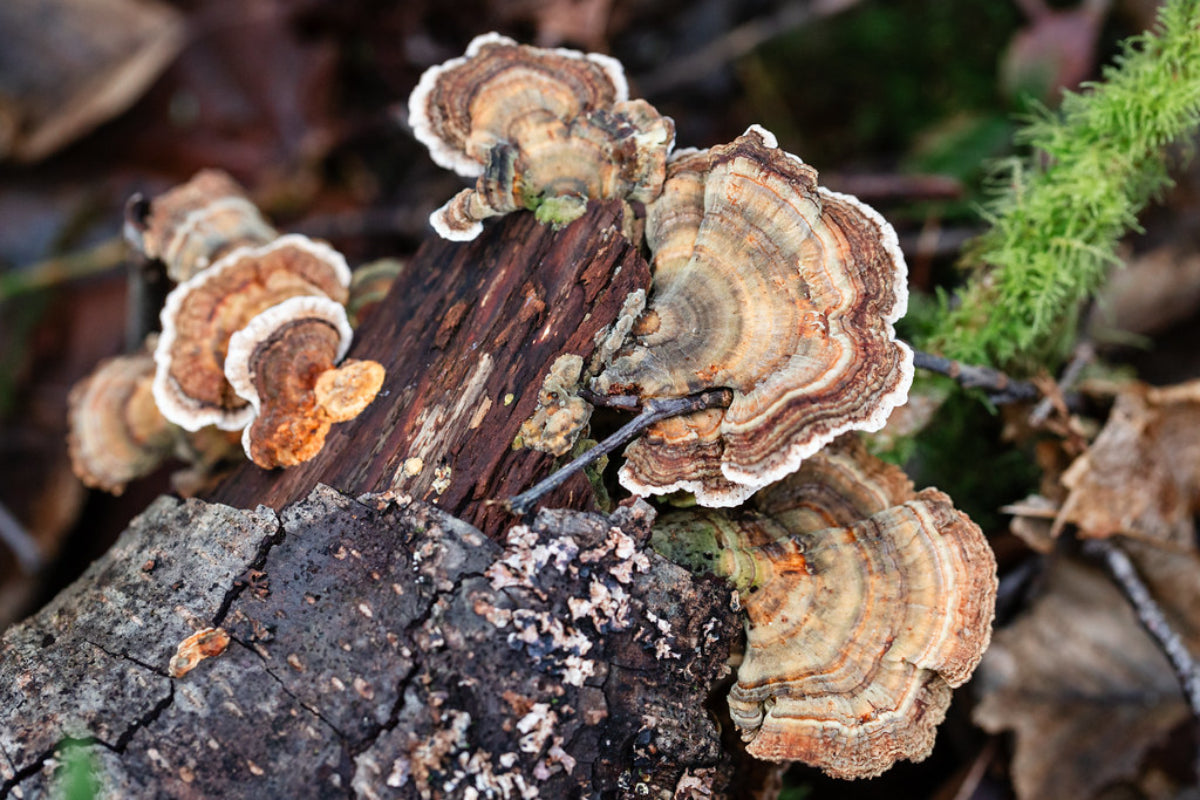
Safety and Potential Side Effects
General Safety Profile
Turkey Tail mushroom has an excellent safety record with few reported adverse effects:
- Long history of use: Its traditional use spanning centuries across multiple cultures suggests general safety.
- Research safety: Clinical studies have generally found Turkey Tail to be well-tolerated.
- FDA status: In the United States, Turkey Tail is considered a dietary supplement rather than a drug, though specific extracts are used as pharmaceutical agents in other countries like Japan.
Possible Side Effects
While generally safe, some individuals may experience:
- Digestive discomfort: Mild gastrointestinal effects like bloating or gas, particularly when first starting supplementation
- Taste and sensory issues: Tea and liquid extracts have a bitter taste that some find unpleasant
- Allergic reactions: Though rare, allergic responses to mushrooms are possible
Precautions and Contraindications
Certain individuals should exercise caution with Turkey Tail:
Medical Conditions
Consult a healthcare provider before using Turkey Tail if you have:
- Mushroom allergies: Obvious contraindication
- Autoimmune conditions: Due to immune-modulating effects, those with autoimmune disorders should use under medical supervision
- Bleeding disorders: Some mushrooms may have mild blood-thinning effects
Medication Interactions
Potential interactions include:
- Immunosuppressants: Theoretical interaction due to immune-stimulating properties
- Anticoagulants: Possible additive effect with blood-thinning medications
- Diabetes medications: May potentially enhance the effects of blood sugar-lowering drugs
Special Populations
- Pregnancy and breastfeeding: Insufficient safety data exists; generally recommended to avoid or use only under healthcare provider guidance
- Children: Limited research in pediatric populations; consult with a pediatric healthcare provider
- Pre-surgical: Generally advised to discontinue use at least two weeks before scheduled surgery due to potential mild blood-thinning effects
When to Consult a Healthcare Provider
It's particularly important to seek professional guidance:
- Before using for specific health conditions
- If taking multiple medications
- If experiencing unexpected side effects
- If considering use for children, during pregnancy, or while breastfeeding
- If planning to use alongside cancer treatment or other serious medical interventions
Frequently Asked Questions
How Long Does It Take to See Benefits from Turkey Tail?
The timeframe for experiencing benefits from Turkey Tail varies based on several factors:
- General immune support: Some people report feeling more resilient within 2-4 weeks of consistent use
- Gut health improvements: Changes in digestive comfort and function may become noticeable within 2-8 weeks
- Deeper immunological changes: Some of the more profound immune-modulating effects may take 2-3 months of consistent use to fully manifest
- Individual variation: Response time varies significantly between individuals based on factors like baseline health status, dosage, product quality, and individual biochemistry
Consistency is key—Turkey Tail works best when taken regularly over time rather than occasionally or sporadically.
Can Turkey Tail Be Taken Daily Long-Term?
Turkey Tail appears safe for long-term daily use for most individuals:
- Traditional use: In traditional medicine systems, Turkey Tail has been used for extended periods without reported issues
- Modern research: Studies using Turkey Tail extracts for periods of 1-3+ years have generally found it to be well-tolerated
- Cycling option: Some herbalists and mycologists recommend occasional breaks (such as 5 days on, 2 days off, or 3 months on, 1 month off) when using any supplement long-term, though there's limited evidence that this is necessary with Turkey Tail
For most healthy individuals, daily use appears safe, though consulting with a healthcare provider about long-term use is always prudent.
Is Turkey Tail Safe to Take with Other Medicinal Mushrooms?
Turkey Tail combines well with other medicinal mushrooms, and such combinations are common in both traditional practice and modern formulations:
- Complementary effects: Different medicinal mushrooms often have complementary properties—for example, combining Turkey Tail's immune-modulating effects with Reishi's stress-reducing properties or Lion's Mane's cognitive benefits
- Synergistic potential: Some research suggests combinations of medicinal mushrooms may offer synergistic benefits beyond what each provides individually
- Common combinations: Turkey Tail is frequently combined with Reishi, Shiitake, Maitake, and Chaga in immune-supporting formulas
When combining multiple mushrooms, starting with lower doses of each and gradually increasing is a prudent approach to ensure tolerance.
What's the Difference Between Turkey Tail and Chaga?
Though both are medicinal mushrooms with immune-supporting properties, Turkey Tail and Chaga differ in several important ways:
Growth Patterns and Appearance
- Turkey Tail: Grows on dead or dying trees as thin, flexible brackets with distinctive concentric color zones resembling a turkey's tail
- Chaga: Technically a parasitic fungus that grows primarily on birch trees, forming a black, charcoal-like conk with a orange/golden interior
Key Compounds and Properties
- Turkey Tail: Particularly rich in PSP and PSK (protein-bound polysaccharides) with significant research on immune modulation and cancer support
- Chaga: Contains betulinic acid (from birch trees), extremely high antioxidant levels, and compounds that support stress adaptation
Traditional and Modern Uses
- Turkey Tail: Historically used for infection resistance, vitality, and adaptability; modern research focuses on immune function, cancer support, and gut health
- Chaga: Traditionally used for gastrointestinal health, skin conditions, and overall vitality; modern research emphasizes its exceptional antioxidant properties and potential stress-protective effects
Both mushrooms have valuable but somewhat different properties, and many people choose to use both as part of a comprehensive approach to health.
Conclusion
Turkey Tail mushroom stands as one of nature's most impressive immunological allies, with a remarkable combination of traditional wisdom and modern scientific validation. From its powerful immune-modulating polysaccharides to its gut-supporting prebiotic effects and potential role in cancer support, this humble forest mushroom offers a wide spectrum of benefits for human health and wellbeing.
What makes Turkey Tail particularly valuable in today's health landscape is its holistic approach to supporting the body's natural functions—not by overriding or suppressing systems, but by providing compounds that help optimize and balance our innate physiological processes. This aligns perfectly with growing interest in natural approaches that work with the body rather than against it.
As research continues to unveil more about Turkey Tail's mechanisms and applications, we're likely to gain even deeper appreciation for this mushroom that traditional healers have revered for centuries. Whether you're seeking everyday immune support, recovering from illness, or looking to optimize your long-term health, Turkey Tail offers scientifically-backed benefits worth considering as part of your wellness approach.
When selecting Turkey Tail products, quality matters significantly—look for reputable sources that prioritize fruiting body extracts, transparent testing, and clear information about sourcing and processing. As with any natural supplement, consistency in use typically yields the best results, allowing the body time to respond to Turkey Tail's beneficial compounds.
While not a replacement for a healthy lifestyle or appropriate medical care, Turkey Tail represents a powerful example of how traditional botanical wisdom and modern scientific understanding can converge to offer natural solutions for some of our most pressing health challenges. Its long history of safe use, combined with growing research support, makes it one of the most promising natural health supplements available today.





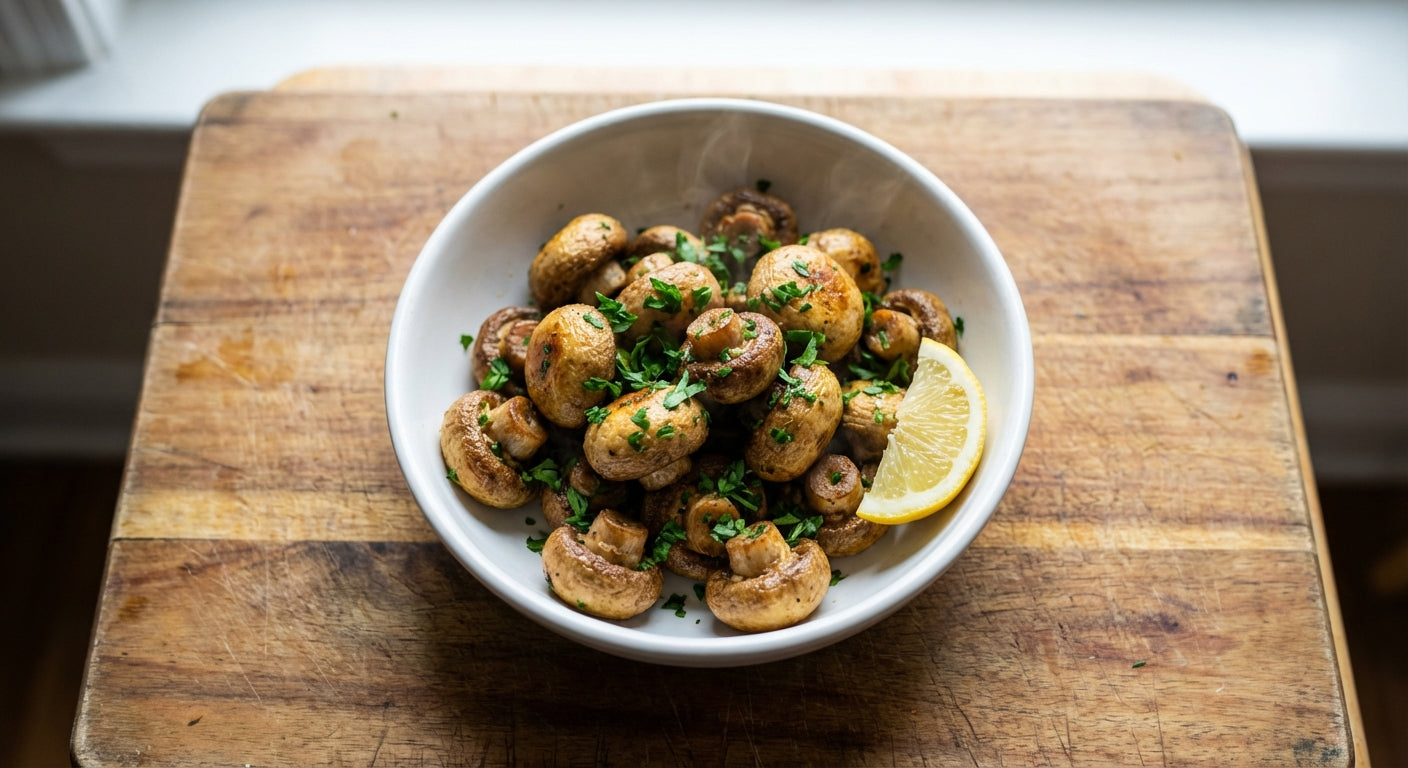



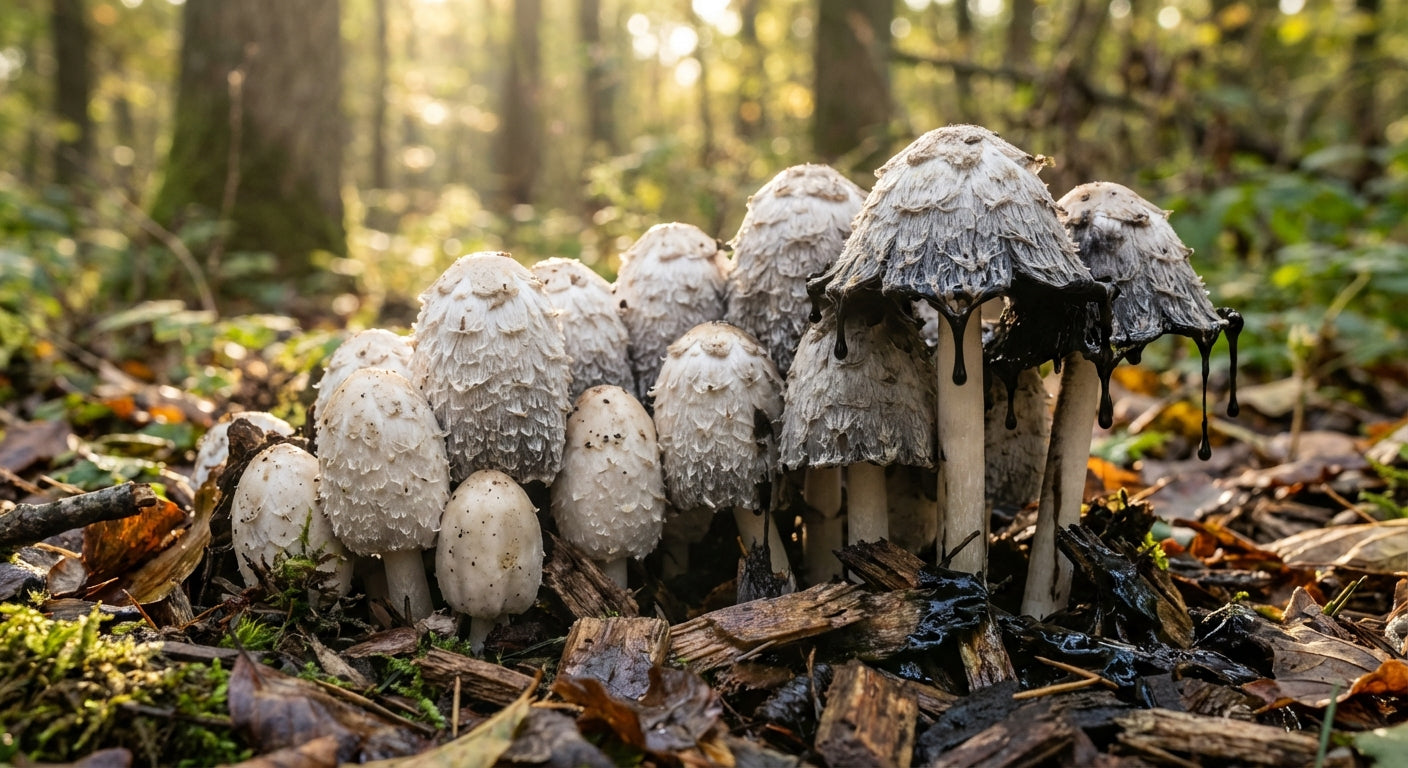

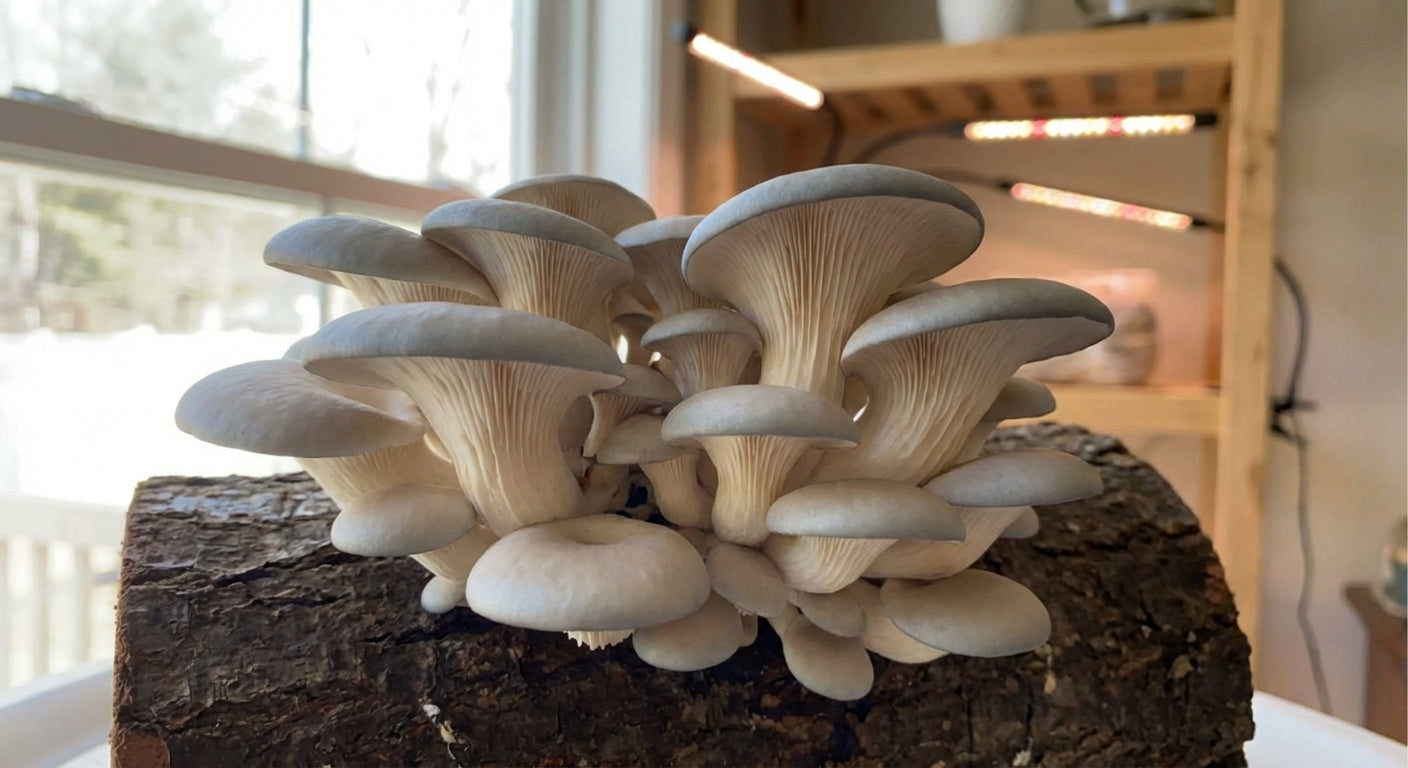
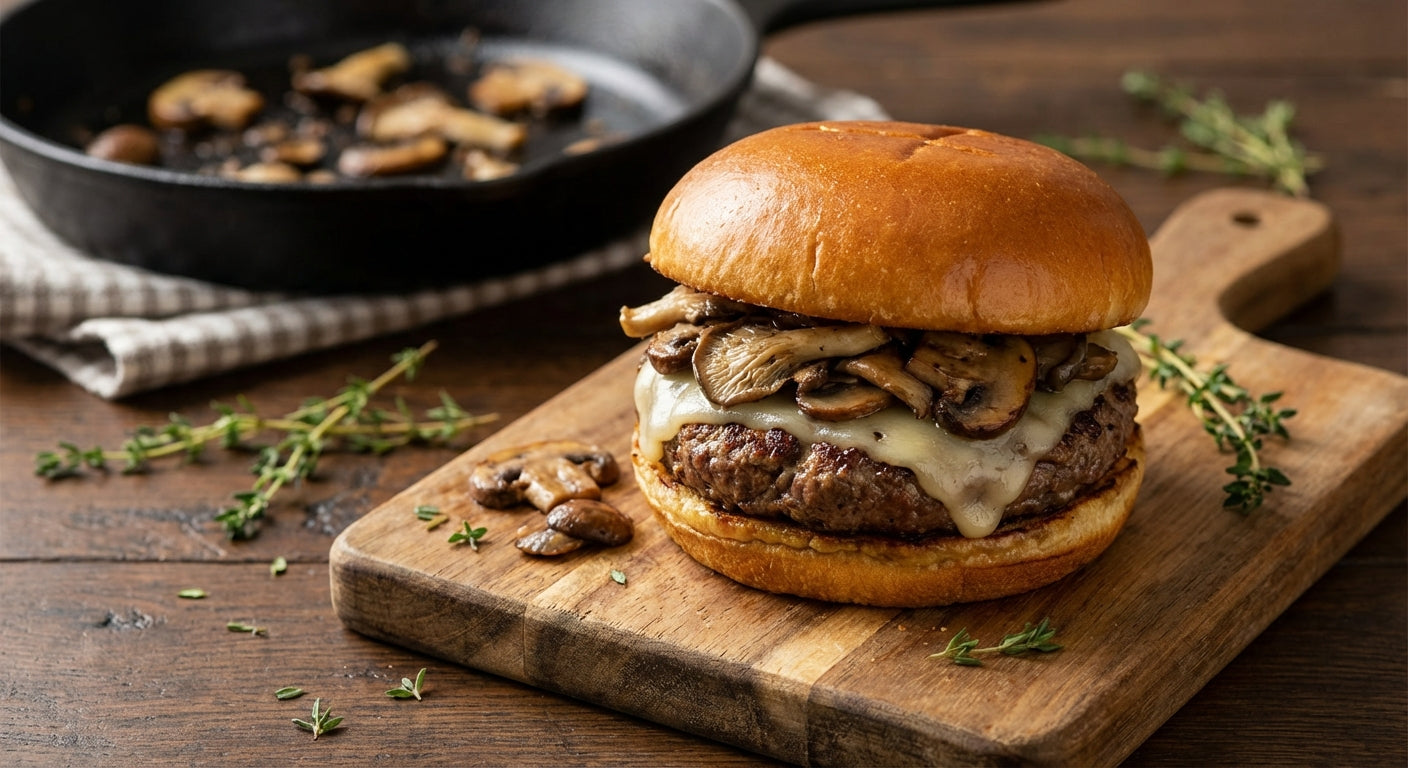



Share:
Lion’s Mane Mushroom Cultivation Guide: How to Grow This Gourmet Fungi at Home
Grow Your Own Gourmet Mushrooms at Home with Lykyn